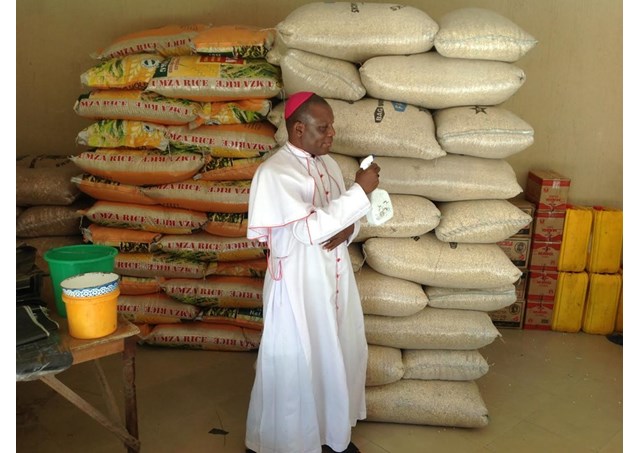
Many Nigerians brave suicide Bombers to attend Christmas Mass

Urbi et Orbi
This year’s “Urbi et Orbi” address by Pope Francis also had a word for Nigeria. As if in response to Pope Francis, hundreds of Catholics many of the them victims of Boko Haram, earlier cast aside fear of suicide bombers and attended Mass in Maiduguri.
“Urbi et Orbi” meaning "to the city of Rome and to the World” is an address and blessing given at Easter and on Christmas day by the Pope, at noontime.
Pope Francis consoles Nigeria
This Christmas, Pope Francis’ gaze turned to Nigeria and Africa: “May Christ the Saviour give peace to Nigeria, where [even in these hours] more blood is being shed and too many people are unjustly deprived of their possessions, held as hostages or killed. I invoke peace also on the other parts of the African continent, thinking especially of Libya, South Sudan, the Central African Republic and various regions of the Democratic Republic of the Congo. I beseech all who have political responsibility to commit themselves through dialogue to overcoming differences and to building a lasting, fraternal co-existence,” Pope Francis said.
These touching words by Pope Francis certainly brought a glimmer of Christmas hope to many citizens of Northeastern Nigeria. The people of Nigeria know that they are not alone in their suffering.
Diocese of Maiduguri at the centre of humanitarian assistance
Bishop Oliver Dashe Doeme of Maiduguri Diocese, an area said to be the epicenter of Boko Haram atrocities, says the situation in the affected states continues to be miserable. His Christmas homily was one of consolation. He told the people that their names were written in the book of life in heaven even as they suffer pain and rejection on earth.
Bishop Doeme also told Vatican Radio’s English Service for Africa, through Fr. Gideon Obasogie, the Maiduguri Diocese Communications Director, that the take-over of many towns and villages in the Northeast part of Nigeria by Boko Haram has resulted in many Internally Displaced People (IDPs). Some people are living in caves and in the forest. Others have sought refuge in houses of well-wishers and Church buildings in areas that are “still safe” from attacks by Boko Haram.
13 000 people have been killed since 2010
The respected “Internal displacement monitoring centre” says that “attacks by Islamist Boko Haram militants increased dramatically from mid-2014, causing an unprecedented protection crisis in Northeastern Nigeria. The insurgency has reportedly forced 1.5 million people to flee to other parts of the country and at least another 150,000 have taken refuge in neighbouring Chad, Niger and Cameroon.”
“Africa Check.org” quotes Nigerian President, Goodluck Jonathan, who says that more than 13 000 people have been killed since the start of the Boko Haram insurgency in 2010. The figure is broadly said to be accurate by many organisations monitoring the situation in Nigeria.
Boko Haram claim that they are on a mission to establish an Islamic state in Northeastern Nigeria. Their brutal campaign has targeted Christians, Churches, schools and markets. Increasingly, Mosques and Moslem populations are no longer spared.
Boko Haram have since acquired tanks, rocket launchers and anti-aircraft weapons. The recent escalation in the use of women wearing suicide vests marked yet another desperate but significant low in tactics. The abduction of at least 276 schoolgirls from a government secondary school in Chibok town, in Southern Borno State, was as shocking as it was daring. Since their abduction on 14 April 2014, the whereabouts of 219 girls remains a mystery.
Critics say that starting from about October, they have noted an improvement in military operations against Boko Haram. Notwithstanding the challenges, the Nigerian army is said to have made some laudable strides in reducing Boko Haram attacks. Towards the end of December, this year, a Nigerian court martial sentenced 54 soldiers to death for refusing to fight Boko Haram.
The universal Church stands with the people of Nigeria
In the meantime, the Diocese of Maiduguri continues to do its part together with Yola Diocese in assisting those who have fled the violence. The people urgently need water, food, clothes, shelter and medical care, Bishop Oliver Dashe Doeme of Maiduguri Diocese says.
In all these efforts, the universal Church and Pope Francis, in particular, are with all those who suffer but in a special way the Holy Father is with the people of Nigeria.
(Fr. Paul Samasumo)
e-mail: engafrica@vatiradio.va
| All the contents on this site are copyrighted ©. |


